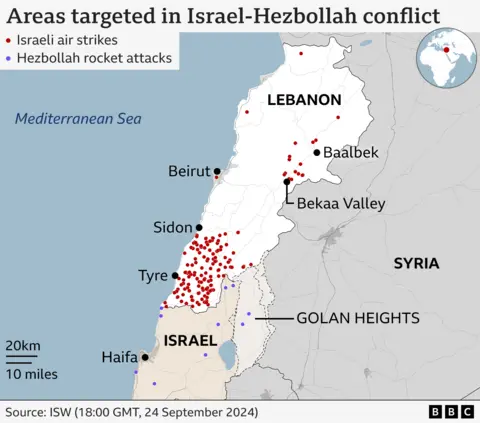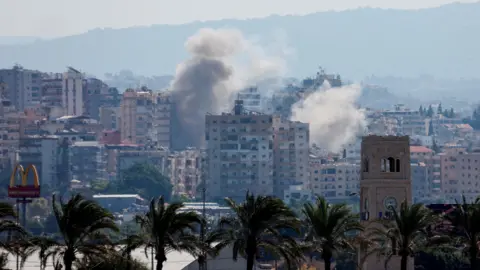 Reuters
ReutersIsrael’s military chief has told troops that extensive air strikes in Lebanon targeting the armed group Hezbollah are preparing the ground for them to “enter enemy territory”.
“You hear the jets overhead; we have been striking all day. This is both to prepare the ground for your possible entry and to continue degrading Hezbollah,” Lt Gen Herzi Halevi said.
Lebanon’s health minister said more than 50 people were killed in strikes on Wednesday, which the Israeli military said hit Hezbollah’s intelligence directorate, as well as launchers and weapons stores.
It came after Israel said it shot down the first missile launched by Hezbollah to reach Tel Aviv, in another significant escalation.
There were no reports of damage or casualties following that missile attack, which Hezbollah said targeted the Mossad spy agency’s headquarters. But Lt Gen Halevi said the group had “expanded its range of fire” and would “receive a very strong response”.
Hezbollah also fired dozens more rockets into northern Israel, causing several injuries.
More than 600 people have been reported killed across Lebanon since Monday, when Israel began an intense and widespread air campaign to destroy what it said was infrastructure built up by Hezbollah since they last fought a war in 2006.
Another 90,000 people in Lebanon have been displaced since Monday, adding to the 110,000 who had fled their homes before the escalation, according to the UN. Almost 40,000 are living in shelters across the country.
Nearly a year of deadly cross-border fighting sparked by the war in Gaza has also displaced more than 70,000 people in northern Israel, whose safe return the Israeli government and military say they want to ensure.
Hezbollah says it is attacking Israel in support of its Palestinian ally, Hamas, and will not stop until there is a ceasefire in Gaza. Both groups are backed by Iran and proscribed as terrorist organisations by Israel, the UK and other countries.
Despite growing international calls for de-escalation, neither Israel nor Hezbollah appear interested in backing down.
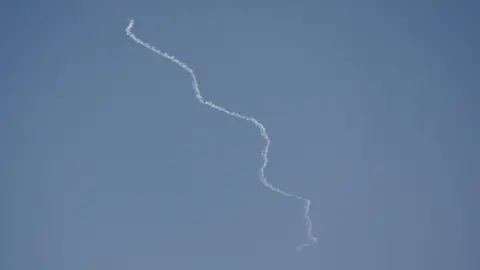 Reuters
Reuters“We are not stopping; we keep striking and hitting them everywhere,” a statement from the Israel Defense Forces (IDF) quoted Lt Gen Halevi as telling soldiers from the 7th Brigade taking part in an exercise on Israel’s northern border on Wednesday.
“The goal is very clear – to safely return the residents of the north. To achieve that, we are preparing the process of a manoeuvre, which means your military boots, your manoeuvring boots, will enter enemy territory.”
“You will go in, destroy the enemy there, and decisively destroy their infrastructure,” he added.
There was no immediate sign that Israel was poised to launch an invasion.
But the IDF chief of staff’s remarks were published not long after the IDF called up two reserve brigades for what it described as “operational missions in the northern arena”.
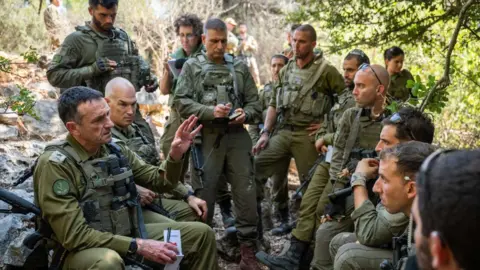 IDF
IDFAt the same time, the IDF said fighter jets had hit more than 280 “Hezbollah terror targets” in a new wave of air strikes across Lebanon.
They included weapons storage facilities, ready-to-use launchers, as well as intelligence-gathering tools, command centres and other infrastructure belonging to the group’s intelligence directorate, it said.
Lebanese Health Minister Firass Abiad told reporters that the strikes had killed at least 51 people and injured 223, without saying how many were civilians or combatants.
Earlier, the health ministry had reported deadly Israeli attacks in the southern areas of Bint Jbeil, Ain Qana and Tebnin.
People were also killed in Joun, in the Chouf mountains near the southern city of Sidon, as well as Maaysrah, in another mountainous area north of Beirut, and the Baalbek-Hermel region, in the north of the Bekaa Valley, it said.
The displacement of families from the south also continued, with Mr Abiad warning that the number of people affected might be in the hundreds of thousands.
Hezbollah has remained defiant, vowing to continue with its attacks, amid speculation that Israel could launch a ground invasion of southern Lebanon to create a “buffer zone”, destroy its infrastructure, and push fighters away from the border.
The surface-to-surface ballistic missile the group launched on Wednesday morning set off air raid sirens in Tel Aviv and Netanya, another coastal city just to the north.
The IDF said the projectile was intercepted by its aerial defence array, and that the launcher was subsequently destroyed in an air strike in the Nafakhiyeh area of southern Lebanon.
Hezbollah said in a statement that the Qader-1 missile had targeted the “command headquarters of the Mossad in the suburbs of Tel Aviv”, which it said was “responsible for the assassination of leaders and the bombing of pagers and wireless devices”.
IDF spokesman Lt Col Nadav Shoshani said the missile was heading “towards civilian areas in Tel Aviv”, noting that “the Mossad headquarters is not in that area”.
He told reporters that Hezbollah was “definitely trying to escalate the situation”. “This is just part of it,” he added. “They are… trying to terrorise more and more people.”
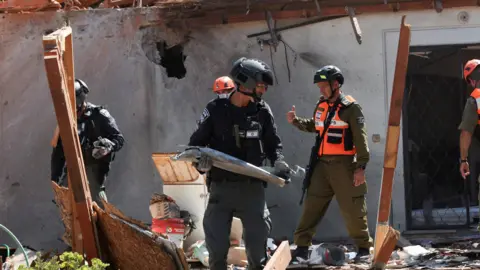 Reuters
ReutersBy firing the missile, Hezbollah could have been trying to send a message to Israel that it remains a threat despite an unprecedented wave of attacks that has severely damaged its ability to operate.
First, on Tuesday and Wednesday last week, 39 people were killed and thousands were wounded when pagers and walkie-talkies used by Hezbollah members to communicate exploded in two waves across Lebanon.
Then, an Israeli air strike on Friday on the group’s stronghold of Dahieh, in southern Beirut, essentially wiped out the chain of command of its main fighting unit, the Radwan Force. The group confirmed that one of its top military leaders, Ibrahim Aqil, was among 55 people killed.
And on Monday, Israel started an intense and widespread air campaign targeting Hezbollah positions and weapons in southern Lebanon and the Bekaa Valley.
The Lebanese health minister said many civilians were among the approximately 500 killed, making it the deadliest day in Lebanon since the end of the civil war more than three decades ago.
The Israeli government has neither confirmed nor denied involvement in the electronic device attacks. However, a senior Israeli official said on Tuesday that the intensification of the country’s attacks against Hezbollah “started with various explosions of pagers”.
Also on Wednesday, Israel’s ambulance service said that it had treated two people wounded, one of them seriously, by shrapnel from a Hezbollah rocket that landed in Kibbutz Saar, near the northern coastal city of Nahariya.
Rocket fire also caused heavy damage to an assisted living home to the east in the town of Safed, near the Sea of Galilee, and sparked a number of wildfires, according to police and fire fighters. No injuries were reported.
Hezbollah claimed its fighters had fired dozens of rockets towards a town near Safed as well as an Israeli military base.
